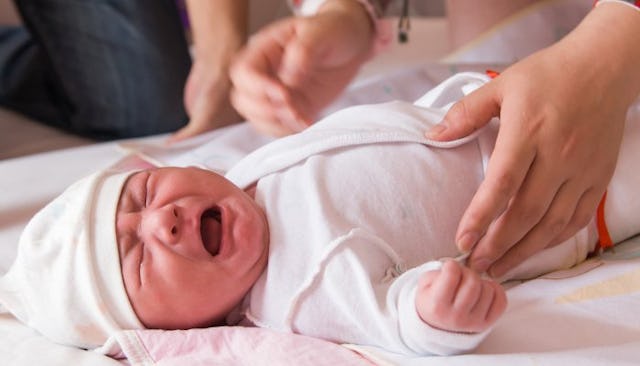If You Want To Sleep Through The Night At 2 Months, Have A Gerbil Not A Baby

Pediatric practice recommends letting infants cry themselves to sleep as early as two months old
Becoming a parent means losing sleep. It’s a fact we must grudgingly accept as we tend to our baby’s needs throughout the long, exhausting nights. However, a New York City pediatrics practice has come out in support of letting babies “cry it out” as early as two months old, saying it’s possible to sleep train a baby that young. If that sounds wrong to you, you’re not alone.
According to The Wall Street Journal, the doctors at Tribeca Pediatrics have long-supported a method of sleep training known as “extinction” for babies as little as two months old. The idea behind “extinction” is to let your infant cry until they fall asleep without intervening at all.
Yes, for a two-month-old.
The sleep training most parents are familiar with, pioneered by Dr. Richard Ferber, advocates a gradual approach to intervening with your baby’s sleep efforts. If they’re crying, go in every few minutes and check on them. Reassure them. There are charts with specific timings and everything. But even this method is recommended only for babies between 3-5 months old, minimally.
It’s obviously quite a leap — gradually lengthening the response time to your baby’s cries is one thing. Ignoring them outright is another. But that’s what “extinction” means. It seems a bit extreme to apply when it comes to a 2-month-old.
Even the American Academy of Pediatrics recommends controlled crying or “camping out” by a child’s room; not letting them scream until they nod off. Tribeca Pediatrics is pretty unique in suggesting leaving a 2-month-old to cry themselves to sleep. And evidence backs up the fact that it’s unrealistic and bordering on cruel to abandon an infant that young so they can cry until they pass out.
In a study from the journal Early Human Development focused on infants aged 4-10 months old and their mothers found that the stress levels in both baby and mom were elevated when the baby was left to cry themselves to sleep without any intervention from a parent. During the first night, the babies showed outward signs of distress and their bodies backed it up with higher cortisol levels, which indicate a high level of stress. By the third day of the study, the babies showed few or no signs of distress outwardly, but their cortisol levels were still high.
That means they went to sleep, but were still just as stressed out as that first night when they were trying to express how upset they were. They’d merely stopped trying to show it. They’d given up.
Now, before all of you sleep training parents come at me with torches and pitchforks, remember that this study focused on letting the baby cry with NO comfort and reassurance from their mothers. It wasn’t measuring stress levels in babies where their moms came in to pat them on the bum and whisper soothingly every few minutes. This was only babies left to cry on their own. Babies aged 4-10 months, no less.
Now, imagine that for a 2-month-old.
The first three months of a baby’s life are called “the fourth trimester” for a reason. Still acclimating to life outside the security and relative quiet of the womb, a baby needs help adjusting. They need comfort and calm and kindness and reassurance. What they don’t need to is to learn to “toughen up,” which is essentially what Dr. Michel, founder of Tribeca Pediatrics recommends. He tells The Wall Street Journal, “It actually works better at 2 months than at 4 months. It is tougher when the baby is used to more soothing.”
Yikes.
This is all aside from the fact that most babies still need to eat at some point during the night at that age. It is said that 11 pounds is the “magic weight” where babies should be able to get through the night without a feeding. Many 2-month-olds aren’t even close to that. They may still have a very legitimate claim to the boob or bottle at pretty much any time during the night.
What each parent decides to do when their infant won’t sleep is up to them. As the mother of a VERY difficult infant who didn’t sleep his first 5-hour stretch until he was nearly a year old, I keenly understand the desperation a parent feels when their baby won’t sleep. That desperation means parents will believe what a medical professional says if they think it means they might get more sleep.
That’s why it’s crucial that we all trust our guts in the face of actual doctors endorsing a baby that young learning to be on their own. Self-soothing is an important tool for a child to have, but there’s a difference between letting a baby that age fuss for a few minutes before a parent rushes in and ignoring their cries until they exhaust themselves and give up.
No one will tell you that you should answer your baby’s every whimper, but at two months old, no parent should feel like that’s the wrong approach either. Every baby is different, but it’s safe to say that at two months old, if they cry, it’s likely for a damn good reason. No matter what a doctor says.
This article was originally published on